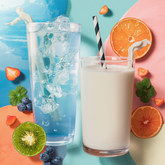In recent years, there has been a surge in interest and adoption of plant-based diets, driven by concerns for personal health, animal welfare, and environmental sustainability. Traditionally, tofu and beans have been the go-to staples for those seeking plant-based protein alternatives. However, the world of plant-based protein is vast and diverse, offering a plethora of options beyond these familiar choices. Let's embark on a journey to explore the rich tapestry of plant-based protein sources that extend far beyond the confines of tofu and beans.
Quinoa: Often mistaken for a grain, quinoa is actually a seed that is packed with protein. It contains all nine essential amino acids, making it a complete protein source. Quinoa is versatile and can be used in salads, soups, stir-fries, or even as a breakfast cereal.
Lentils: While beans are a popular legume, lentils offer a different texture and flavor profile. They are rich in protein, fiber, and various nutrients. Lentils come in different colors and varieties, such as green, red, and black, each offering its own unique taste and culinary applications.
Seitan: Also known as wheat gluten, seitan is a high-protein meat substitute made from wheat gluten. It has a chewy texture and absorbs flavors well, making it a favorite among many plant-based chefs. Seitan can be used in stir-fries, sandwiches, stews, and more.

Edamame: These young soybeans are not only delicious but also packed with protein, fiber, and essential nutrients. Edamame can be enjoyed as a snack, added to salads, or used in stir-fries and soups.
Hemp Seeds: Despite their tiny size, hemp seeds are nutritional powerhouses, containing all essential amino acids and omega-3 fatty acids. They can be sprinkled on top of salads, yogurt, or blended into smoothies for an extra protein boost.
Chickpea Flour: Also known as gram flour or besan, chickpea flour is a versatile ingredient used in various cuisines around the world. It can be used to make savory pancakes, fritters, and even vegan omelets.

Spirulina: This blue-green algae is not only a rich source of protein but also contains vitamins, minerals, and antioxidants. Spirulina can be consumed in powder form, added to smoothies, juices, or used in energy bars.
These are just a few examples of the diverse array of plant-based protein sources available to us. By incorporating a variety of these foods into our diets, we can ensure that we are meeting our nutritional needs while enjoying delicious and satisfying meals.
In conclusion, as we continue to explore the world of plant-based eating, it's important to remember that the possibilities are endless. And for those looking to take their plant-based journey a step further, why not try making your own plant-based milk at home using Milky Plant? In just three minutes, hassle-free, and with plenty of options available for customized plant-based milk, it's a simple yet rewarding way to add more plant-based goodness to your life.















